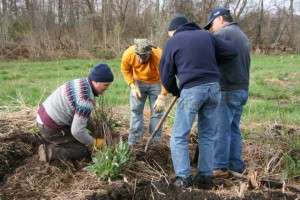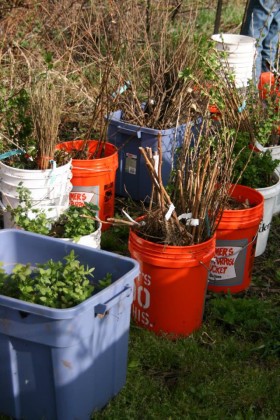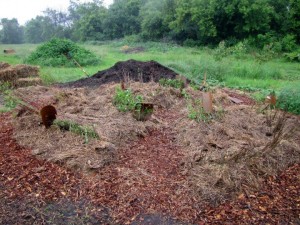Connect










As of this last January, before even announcing his intention to run for re-election, Michigan Governor Rick Snyder already had approximately $4 million in his campaign war chest. Money on the right, it would seem, is relatively easy to come by, when you’re willing to bring the likes of Scott Walker, Jed Bush and Chris Christie into the state to appear alongside you at high-dollar fundraising dinners. On the other side of the aisle, though, the dynamic is a bit different. The wealthy donors are considerably more scarce, and, as a result, we see things like this Thursday evening’s fundraiser at Ann Arbor’s Arbor Brewing Company for Democratic candidate for Governor Mark Schauer, where a mere $25 will get you in. This, as you can imagine, presents significant challenges. While Snyder can afford to air ads during the Super Bowl declaring himself the “comeback kid” (in spite of the fact that Michigan, at the same time, was 49th among the states in projected job growth), Schauer is seeking public funding for his campaign, at least through the August primary. (Schauer has requested close to $1 million in public funding. If it’s offered and accepted, it would mean that he can only spend a total of $2 million through the primary season.) The obstacles for a candidate like Schauer are immense. But there’s an up-side as well. Because Schauer has to work harder for every dollar, and every vote, he actually invests the time to talk with the likes of me.
What follows is a very short exchange between me and the man I hope will be the next Governor of Michigan, Mark Schauer. As time was tight, we didn’t have an opportunity to delve into subjects too deeply, but my hope is that one day soon I’ll have a chance to follow up and dig deeper into these, and other, issues.
MAYNARD: We’d like to think that elections are about ideas, but they’re often more about money. And the person with the best ideas doesn’t always win, especially when the other side has the ability to blanket the public airwaves with ads that, to put it kindly, distort the truth. One suspects, as Snyder has allowed wealthy Michiganders like Dick DeVos to pursue their aggressive conservative agenda unchallenged, that he’ll have their continued financial support during the election. Furthermore, we can assume that Snyder will continue to pull money from out-of-state conservatives, like the Koch brothers, who helped bankroll the successful campaign to make Michigan a so-called right-to-work state. How can you effectively compete against a candidate who has those kinds of resources?
SCHAUER: Rick Snyder has powerful friends. Dick DeVos, Donald Trump, and the Koch brothers are all supporting Snyder. Having said that, Dick DeVos spent tens of millions of his family fortune in 2006, and proved that the candidate with the most money doesn’t always win.
There’s no question we will be outspent in this election, but make no mistake, we will have the resources we need to communicate our message and win this November. That’s why small fundraisers for grassroots supporters are so important – because there are more of us than them.
MAYNARD: This year’s Netroots Nation convention will be held in Detroit, in mid-July. How do you intend to capitalize on that fact?
SCHAUER: It’s a great opportunity for Michigan to showcase two national races for Governor and U.S. Senate. We’re still working out the details, but I expect to participate in at least one panel discussion, and meet with some national bloggers to talk about what’s at stake in this election. Rick Snyder has managed to fly under the radar nationally, but he’s cut from the same cloth as Scott Walker, John Kasich, and Rick Scott. This is our opportunity to shine a bright light on how Snyder’s policies are hurting the middle class and seniors.
MAYNARD: I’m not sure how familiar you are with my website, but, among other things, I occasionally interview people as they leave the Ann Arbor – Ypsilanti area. Just recently, I was conducting one of these exit interviews with a lesbian couple leaving the state for Seattle, and, in response to one of my questions, they essentially said that they didn’t want to live in a state in which they weren’t valued and respected, as evidenced by the passage of recent legislation targeting not only the LGBT community, but women in general. I’m curious what you would say to others who might be on the fence, considering leaving the state.
SCHAUER: I would tell them that help is on the way. I understand their frustration, but that’s why this election is so important. There is a clear contrast in this race. Rick Snyder is out of touch, and his policies are hurting Michigan women and the LGBT community. Whether he was signing extreme anti-choice legislation, or wasting taxpayer dollars to defend Michigan’s discriminatory ban on marriage equality, it’s clear this governor just doesn’t get it.
If you want a sense of how I’ll govern, take a look at my running mate, Lisa Brown. Lisa was an outspoken advocate for women’s reproductive rights in the Legislature, and as Oakland County Clerk, she was one of three clerks in the state to issue marriage licenses to loving, committed same-sex couples. Lisa and I share the same values and vision for Michigan. And as governor, I’ll fight to make sure women earn equal pay for equal work, and I’ll fight to make Michigan a marriage equality state.
MAYNARD: Given that it’s become nearly impossible to legislate at the federal level due to Republican obstructionism, it seems like the states are becoming increasingly more important. And, over the last several years, under Snyder, we’ve seen how effective a party can be when it dominates a state. Among other things, we’ve passed one of the nation’s most restrictive anti-abortion bills. We’ve passed legislation that ensures handpicked Republican judges hear cases brought against the state by citizens. We passed right-to-work legislation, which, just a few years previously would have been unthinkable. We’ve brought the term “rape insurance” to the American discourse… Assuming you win the Governorship, but that Democrats fail to win the House and Senate, what can we realistically expect to happen in terms of rolling back some of this legislation from the far right?
SCHAUER: I think Democrats are poised to pick up seats in both chambers this year. But regardless of which party holds a majority in the legislature, electing a Democratic governor would be an important first step to start undoing the damage we’ve seen over the past four years.
I’ve always been someone who can work across the aisle to get things done. I’m not running for governor just to wear out a veto pen, but I’ll use it as leverage to advance an agenda that helps to grow and strengthen the middle class.
MAYNARD: A few days ago, you made the following statement about Detroit. “It’s time for Detroiters to lead Detroit,” you said. What did you mean by that?
SCHAUER: We have a new democratically-elected mayor and city council in Detroit, and I think they should be leading Detroit’s day-to-day turnaround efforts. Kevyn Orr doesn’t live here, and when his contract expires, he’ll move back to his home in Maryland. We need Detroiters who have a vested interest in the city’s future leading the city, and they should be accountable to voters. That’s how democracy is supposed to work.
If you’d like to contribute toward Mark’s campaign for Governor, you can do so either on his site, or by way of Act Blue. And, if you have the time on Thursday evening, do consider registering here, and coming out to meet Mark at Arbor Brewing. It should be a good event.
Last winter, as part of our Michigan Musicians on Vacation series, I interviewed Great Lakes Myth Society founder Timothy Monger about a trip he’d taken to attend a wedding in Oregon. Well, at some point during the interview, our conversation turned to our shared love of early Bowie and I made the following proposal to Timothy. “If I could raise $25 right now,” I said, “could I commission you to record Moonage Daydream as rural pop?” (Rural pop, as you may recall, was a phrase he’d coined to describe his most recent work, which had been heavily influenced by the farm on which he was living.) Well, he accepted the challenge and we raised the modest sum in no time. And then the polar vortex hit, and I kind of forgot about it. To Timothy’s credit, though, he stayed true to his word. And, earlier this evening, I received the following rendition of Bowie’s Moonage Daydream. Or, to be more correct, I received the following rendition of Arnold Corns’ Moonage Daydream. (Arnold Corns, for those of you unfamiliar with the name, was Bowie’s band prior to the launch of Ziggy Stardust and the Spiders from Mars.)
And here’s a little from the accompanying letter, in which Timothy shares his thoughts on this “enjoyable task.”
…I didn’t really mean to take six months on this Bowie cover, but that just seems to be how I work. When I finally found time to record it, it was a fun project. As “Rural Pop” is an invented genre, I suppose it can be whatever it wants to be. To my ears, it just sounds like me having fun in the basement covering Bowie.
I used the alternate lyrics and the general arrangement of the pre-Ziggy Arnold Corns version. I started off trying to go more of a Neil Young Harvest route in tone, but it just turned into its own strange thing as I continued…
I hope you enjoy it as much as I do.
Now, who should we commission to make art for us next?
My recent ‘axe vs. plunger’ discussion with artist Rebekah Modrak has made it to the popular website Design Observer thanks to an article by former New York Times Magazine columnist and author of Buying In: The Secret Dialogue Between What We Buy and Who We Are, Rob Walker. And, as often happens in cases like this, a whole new demographic is visiting the site. They’ll likely all be gone by tomorrow, but, if you could watch your language for the next 24 hours or so, I’d appreciate it. And it wouldn’t hurt if you could work in the occasional reference to Bauhaus typography, détournement, or kerning… Here’s a clip.
The Ann Arbor Awesome Foundation today announced the award of two $1,000 grants, one of which was given to Ypsilanti’s Jesse Tack for the establishment of a communal permaculture tool shed on the grounds of Dawn Farm, a local treatment facility for addiction. Here, with more on the project, is a quick interview with Jesse, the founder of AMPY (Abundant Michigan Permaculture Ypsilanti).
MARK: You just won an Awesome grant. How do you intend to use the $1,000?
JESSE: The AMPY community has partnered with Dawn Farm to help develop 7.8 acres of mono-cropped farmland into what’s called a restoration agriculture model. Restoration agriculture is the development of staple crops using perennial trees and shrubs with mixed annual crops and animal grazing. As such, the tools needed to make this system perform optimally are pruners, compost tea sprayers, hand saws, scythes, berry rakes, and other low-tech, human-powered tools. We’ll use the Ann Arbor Awesome Foundation award to purchase as many of those items as possible to start our resilience tool shed at Dawn Farm.
MARK: What kinds of trees and shrubs are we talking about, and are there plans for what will happen with the crops that will be produced? Might we, for instance, see the folks at Dawn Farm, in partnership with AMPY, selling nuts in a few years, in order to raise money for their programs?
JESSE: We’re planting chestnut, hazelnut, walnut, pecan, cherry, plum, apricot, apple, elderberry, goji berry, persimmon, pawpaw, lilac, red osier dogwood, willow, black locust, mulberry, sea buckthorn, and siberian pea shrub. We’re also inoculating logs with mushrooms. And we hope to rotate grazing animals between the tree rows. As the trees get taller and stronger, we’ll also plant grapes and hardy kiwi to climb up and provide additional stacked crops.
As for what will happen in the future, I can also imagine many small AMPY businesses arising from this initiative… selling, processing, offering value-added products from these many niche crops.
 MARK: Do you envision the tools being used beyond Dawn Farm?
MARK: Do you envision the tools being used beyond Dawn Farm?
JESSE: Yes. The tools will be stored at Dawn Farm, and primarily used to manage the restoration agriculture system in development there, but they’ll have uses beyond Dawn Farm. The greater AMPY group will be able to access the tools through a tool sharing system. The tools will need to be checked in and out by myself, or one of the other co-managers of the Dawn Farm project, but they’ll be available. Some tools, like the scythes, are skill-based, and would need specific training to operate properly. And teaching how to use these tools, by the way, is another way for AMPY to contribute to the greater reskilling effort of our local human culture.
MARK: If folks are interested, how would they go about joining AMPY?
JESSE: Anybody can join the Facebook group. Just visit our page, and ask to join. The same goes for our email list. It doesn’t matter if you live in Ypsi or not. Just email me at jessedavidtack@gmail.com, and I’ll add you to the list. Both keep people up-to-date on upcoming events.
MARK: How did your partnership with Dawn Farm come about?
JESSE: Shortly after AMPY was founded, and began holding monthly events, Monica King connected Grace Yoder to AMPY’s work. Grace is the garden manager at Dawn Farm, and she’s always graciously inviting the local community to engage with Dawn Farm… growing food, raising animals, growing flowers, setting up beehives, and the like. She invited myself and AMPY to come out, and my first thought was restoration agriculture. My interest in permaculture is on the broad-acre, and, as Dawn Farm is a 65 acre site, I figured, if we could do anything there, it would have to demonstrate locally how to manage large-scale food systems regeneratively.
 MARK: Have you seen such restoration agriculture projects executed successfully elsewhere?
MARK: Have you seen such restoration agriculture projects executed successfully elsewhere?
JESSE: As far as the system of plants and animals, restoration agriculture here would mimic the biome that existed in Michigan since the last ice age – the Oak Savanna. So, in that sense, we have no doubt that these systems will work and persist, even without human tending. We are also aware, however, that the climate is shifting and, as such, we’ll be planting experimental crops that will thrive in both colder weather patterns and warmer.
When it comes to the human managed landscapes and their economic potential, Mark Shepard, who has a model 110-acre farm in Viola, Wisconsin, literally wrote the ‘Restoration Agriculture’ book. His farm demonstrates the key principles of restoration agriculture – managing water using keyline design (which is why these farms do not plant in straight rows), mimicking the local biome, planting en masse for genetic diversity, mixed production with perennials and animals as essential partners, and stacking many economic returns and enterprises onto one site.
On Mark’s farm, they have separate businesses to manage… they raise and sell ruminating animals, the grow apples and sell hard cider, they manage and sell nut crops, and they grow oil crops (sunflowers and hazelnuts) to run their machinery. The potential is there in the marketplace for these niche crops to support numerous small enterprises.
One last thing to mention regarding Mark’s work is that he uses the STUN method. STUN stands for Sheer Total Utter Neglect. And we’re following the same method at Dawn Farm. This means we really overstock our farm with young trees and we refrain from babying them, and instead allow those weaker plants to die, and propagate out those plants that survive and demonstrate the genetic characteristics that we desire – drought tolerance, early producing, quality of the fruit, and pest resistance. This lowers establishment costs with trees as we buy them at less than $1 per tree and plant them at 2 foot spacings, with the understanding that many will die, but those that live will be suited to our particular site.
JESSE: I grew up in Lapeer, Michigan, as a happy, nature-loving kid. I experienced a sort of death process throughout my late teens and twenties wherein all of my cultural beliefs fell into dissolution. I began to live in an anarchical, and even nihilistic, manner. Eventually, finding no positive actionable steps to take in politics, philosophy, or rebellion, I discovered permaculture as both a positivistic mode of being and a new operating system for living on Earth. I’m also trained as a musician and a music therapist, and currently work as a music therapist, as well as teach meditation and mindfulness practices.
MARK: How’d you hear about the Ann Arbor Awesome Foundation?
JESSE: Through an AMPY member last year. She had suggested applying for a grant at that time, and we just didn’t have the ability at the time. This year, with the Dawn Farm project moving forward, we certainly have the need for the extra support that this grant offers.
MARK: When did AMPY begin, and how’s the organization evolved since that point?
JESSE: In 2012, my good friend Travis Childs and I hosted a Permaculture Design Course (PDC) in Detroit at a ridiculously low price to help serve the city which we both love. In the aftermath of going broke and crazy trying to pull all of the pieces together for a world-class PDC, I realized how little I had organized, energized, and activated in my own town of Ypsilanti. It was September of 2012 that AMPY started after meeting with a few local sustainable-type folks and seeing a need for a permaculture-focused action group.
Our evolution includes moving past the largely failed design application of the formation of guilds, which, in hindsight, doesn’t seem to make sense unless there are significant numbers of motivated people to enliven and energize the guilds. Our successes have been built upon in a slow and steady fashion.
One slow and steady success for AMPY has been maintaining a commitment to hosting monthly meetings to share knowledge and experiences on the first Monday of each month. Those meetings have become the nexus of sharing ideas with community members and regular community building engagement.
We also host numerous workdays throughout the warm months… And we’re developing a resource list of people, skills, tools, and abilities within Ypsilanti… And we encourage and organize group purchasing and group working parties as both make light work of otherwise arduous projects.
MARK: Where else are you planting?
 JESSE: We’re in the process of developing three to five sites within the city of Ypsilanti to act as demonstration sites for neighborhood associations and individuals to replicate with good sustainable practices for food, water, energy, and fiber sustainability. And, in doing this, we’re are building an incredibly valuable skill set within the AMPY group, from edible landscaping to restoration agriculture development, from fermentations to growing perennial seeds, from building resiliency in our local landscapes to building resiliency into our homesteads.
JESSE: We’re in the process of developing three to five sites within the city of Ypsilanti to act as demonstration sites for neighborhood associations and individuals to replicate with good sustainable practices for food, water, energy, and fiber sustainability. And, in doing this, we’re are building an incredibly valuable skill set within the AMPY group, from edible landscaping to restoration agriculture development, from fermentations to growing perennial seeds, from building resiliency in our local landscapes to building resiliency into our homesteads.
MARK: Any parting words?
JESSE: As the current cultural designs continue to erode and fail, the average family/individual, permaculture and other sustainable systems will continue to proliferate locally. And AMPY will continue to ‘hold the space’ as the need for self-reliant communities and neighborhoods continues to come more into focus for individuals in Ypsi and beyond… Blame no one. Expect nothing. Do epic shit.
[Those with great, inspiring ideas who wish to apply for an Awesome grant, can do so here.]